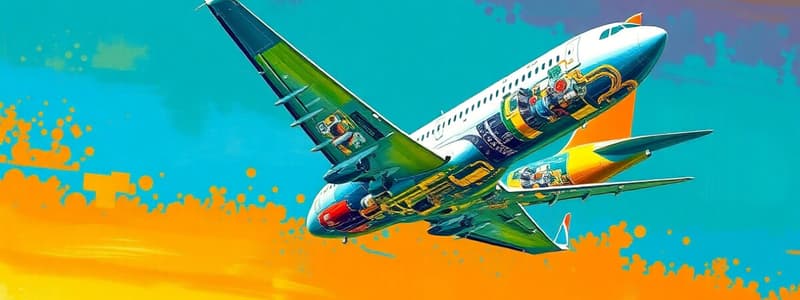Podcast
Questions and Answers
What is the primary advantage of using the various levels of automation in the A320 autoflight system?
What is the primary advantage of using the various levels of automation in the A320 autoflight system?
- It ensures that the aircraft follows a predetermined route perfectly.
- It reduces fuel consumption during long flights.
- It provides a means for pilots to make direct inputs at any time.
- It increases safety and comfort while reducing crew workload. (correct)
When referring to the system's operation, what is the term used instead of referring to a single computer?
When referring to the system's operation, what is the term used instead of referring to a single computer?
- Flight Computer
- Auto Flight System
- FMGS (correct)
- FMGC System
Which of the following is NOT a direct input source for the Flight Management Guidance System (FMGS)?
Which of the following is NOT a direct input source for the Flight Management Guidance System (FMGS)?
- Radio Navigation Data
- Thrust Lever Position (correct)
- ADIRS
- GPS
In the context of the A320 auto flight system, what is the fundamental difference between 'managed' and 'selected' guidance?
In the context of the A320 auto flight system, what is the fundamental difference between 'managed' and 'selected' guidance?
Which of these statements correctly describes the functions of the FMGS?
Which of these statements correctly describes the functions of the FMGS?
What is the primary function of the Flight Augmentation Computer (FAC) within the FMGS?
What is the primary function of the Flight Augmentation Computer (FAC) within the FMGS?
During a CAT IIIB approach, what is the key operational difference when compared to a CAT IIIA approach in regards to the autopilot?
During a CAT IIIB approach, what is the key operational difference when compared to a CAT IIIA approach in regards to the autopilot?
If both Autopilot 1 and Autopilot 2 are engaged, which FMGC will be the master?
If both Autopilot 1 and Autopilot 2 are engaged, which FMGC will be the master?
What is the function of the instinctive disconnect pushbutton found on the sidestick?
What is the function of the instinctive disconnect pushbutton found on the sidestick?
Which FMGS function provides the autopilot commands necessary to control the aircraft’s pitch, roll, and yaw?
Which FMGS function provides the autopilot commands necessary to control the aircraft’s pitch, roll, and yaw?
In 'managed' mode, what is typically displayed in the corresponding window on the FCU?
In 'managed' mode, what is typically displayed in the corresponding window on the FCU?
When the SPD/MACH selector knob is pulled, what determines speed regulation if autothrust is in THR CLB mode?
When the SPD/MACH selector knob is pulled, what determines speed regulation if autothrust is in THR CLB mode?
What is the primary function of the HDG-V/S/TRK-FPA pushbutton?
What is the primary function of the HDG-V/S/TRK-FPA pushbutton?
What is the effect of pushing the Altitude selector knob?
What is the effect of pushing the Altitude selector knob?
What action is initiated by pushing the V/S-FPA selector knob?
What action is initiated by pushing the V/S-FPA selector knob?
Under what condition would the LOC pb be used?
Under what condition would the LOC pb be used?
What is the function of the EXPED pushbutton?
What is the function of the EXPED pushbutton?
When both autopilot and flight director systems are off, which FMA display remains visible?
When both autopilot and flight director systems are off, which FMA display remains visible?
What is the immediate effect of using an instinctive disconnect on associated alerts?
What is the immediate effect of using an instinctive disconnect on associated alerts?
During a dual approach, what happens to the approach capability if an autopilot disconnect occurs?
During a dual approach, what happens to the approach capability if an autopilot disconnect occurs?
When is the yaw bar index displayed instead of the roll guidance command bar?
When is the yaw bar index displayed instead of the roll guidance command bar?
What is the primary function of the Flight Control Unit (FCU)?
What is the primary function of the Flight Control Unit (FCU)?
Following activation of the Flight Path Vector (FPV), what does the Flight Path Director (FPD) command when approaching the selected track?
Following activation of the Flight Path Vector (FPV), what does the Flight Path Director (FPD) command when approaching the selected track?
What is indicated by the FMA display '1FD-'?
What is indicated by the FMA display '1FD-'?
What happens to the flight director command display when a go-around is initiated while in TRK/FPA mode?
What happens to the flight director command display when a go-around is initiated while in TRK/FPA mode?
Flashcards
What is the FMGS?
What is the FMGS?
The FMGS (Flight Management Guidance System) is the core of the A320's automated flight system, managing the aircraft's flight plan, calculations, and guidance. It uses input from various sources like ADIRS, GPS, and Radio Navigation to determine the aircraft's position and plan the flight path.
What are FMGCs?
What are FMGCs?
The FMGS consists of two FMGCs (Flight Management Guidance Computers) which usually work synchronously. They handle all the complex calculations for the FMGS.
How does the FMGS control the aircraft?
How does the FMGS control the aircraft?
The FMGS provides signals to operate the Autopilot and Auto thrust, ensuring the aircraft follows the planned flight path.
What is "managed" guidance?
What is "managed" guidance?
Signup and view all the flashcards
What is "selected" guidance?
What is "selected" guidance?
Signup and view all the flashcards
What does the Flight Management part of the FMGS do?
What does the Flight Management part of the FMGS do?
Signup and view all the flashcards
What does the Flight Guidance part of the FMGS do?
What does the Flight Guidance part of the FMGS do?
Signup and view all the flashcards
What does the Flight Augmentation Computer (FAC) do?
What does the Flight Augmentation Computer (FAC) do?
Signup and view all the flashcards
What is the role of synchronization in the FMGCs?
What is the role of synchronization in the FMGCs?
Signup and view all the flashcards
What do the FMGCs provide signals to?
What do the FMGCs provide signals to?
Signup and view all the flashcards
What is the FCU?
What is the FCU?
Signup and view all the flashcards
What are the four knobs on the FCU?
What are the four knobs on the FCU?
Signup and view all the flashcards
How do you engage a mode on the FCU?
How do you engage a mode on the FCU?
Signup and view all the flashcards
How many channels does the FCU have?
How many channels does the FCU have?
Signup and view all the flashcards
What happens after an instinctive disconnect?
What happens after an instinctive disconnect?
Signup and view all the flashcards
What does the Flight Director (FD) do?
What does the Flight Director (FD) do?
Signup and view all the flashcards
What are the command bars on the FD display?
What are the command bars on the FD display?
Signup and view all the flashcards
How should the FDs be selected?
How should the FDs be selected?
Signup and view all the flashcards
What is 'managed' mode in FMGS operation?
What is 'managed' mode in FMGS operation?
Signup and view all the flashcards
What is 'selected' mode in FMGS operation?
What is 'selected' mode in FMGS operation?
Signup and view all the flashcards
What does the SPD/MACH selector knob do?
What does the SPD/MACH selector knob do?
Signup and view all the flashcards
What does the HDG/TRK portion of the FCU do?
What does the HDG/TRK portion of the FCU do?
Signup and view all the flashcards
What does the Altitude selector knob do?
What does the Altitude selector knob do?
Signup and view all the flashcards
What happens when you pull the Altitude selector knob?
What happens when you pull the Altitude selector knob?
Signup and view all the flashcards
What happens when you push the Altitude selector knob?
What happens when you push the Altitude selector knob?
Signup and view all the flashcards
Study Notes
A320 Auto Flight System
- The A320 Auto flight system allows for fully automatic flight management, with pilots able to manually override at any time.
- Proper use of automation improves safety, crew comfort, and reduces workload.
- The Flight Management Guidance System (FMGS) uses two identical Flight Management Guidance Computers (FMGCs) which operate synchronously.
- FMGS inputs include data from ADIRS, GPS, and radio navigation systems (providing aircraft position).
- The system uses Flight Control Unit (FCU), EFIS displays, Flight Director (FD) switches, thrust levers, and Multipurpose Control and Display Units (MCDUs) for controls and indicators.
- Two MCDUs and two-channel Flight Control Unit (FCU) allow pilot inputs to the FMGS.
- "Managed" guidance (MCDU inputs) supports long-term flight operations (thrust, pitch, and lateral).
- "Selected" guidance (FCU inputs) handles short-term changes and does not alter the flight plan's thrust, lateral, or vertical data.
- FMGS signals manage autopilots, auto-thrust, flight director, and EFIS displays.
- FMGS automatically tunes navigation radios based on the plane's position.
- FMGS has three components: flight management, flight guidance, and flight augmentation.
- Flight management determines position, manages navigation along the flight plan, optimizes performance (cost, speed, and altitudes), makes predictions (waypoints, altitudes, speeds, fuel, destinations, alternates), and manages data on the EFIS system.
- Flight guidance handles autopilot commands, auto-thrust commands, and flight director commands (for pitch, roll, and yaw).
- Flight augmentation (via the Flight Augmentation Computer (FAC)) calculates flight envelope limits (VLS, VMO, VFE).
- FAC manages maneuvering speeds (VA), low-energy warnings, windshear detection and alerts, angle-of-attack protection (alpha-Floor protection).
- FAC additionally handles yaw damping, rudder trim, rudder limiting, and turn coordination.
- FMGCs synchronize to compare data, with one able to fail, while the other maintains normal operation.
- Inputs to MCDU 1 are connected to FMGC 1, then synchronized with FMGC 2, and vice-versa for MCDU 2.
- FCU inputs are sent to both FMGCs.
- One FMGC acts as a master, while the other acts as a backup, with the active FMGC based on many factors including the specific autopilot in use. For example, in Dual channel mode AP 1 remains the master.
- All pilots using MCDU for autopilot management (long-term actions) and FCU for autopilot changes (short term actions).
Autopilot & Flight Director Engage/Disengage
- Both Flight Director (FD) are typically ON during flight, and an autopilot is selected after takeoff.
- Autopilot 1 is usually selected when the Captain is flying and autopilot 2 when the First Officer is.
- Only one autopilot can be active at a time (except for Dual channel Autoland approaches).
- CAT IIIB approach uses Alert Height rather than Decision Height.
- A CAT 3 Dual system is fail-operational, enabling automatic approach and landing.
- A CAT 3 Single system is Fail-Passive; pilot manually completes the landing after a failure.
- Pilots use instinctive disconnect pushbuttons (on sidesticks and thrust levers) for immediate manual control if malfunction occurs.
- Disconnecting an AP produces an aural warning, flash warning lights, and an AP OFF message on the ECAM.
- Instinctive disconnects are self-clearing and do not cause persistent warnings.
- Non-instinctive disconnects (e.g., failure) show up as ECAM actions needing clearing.
- Dual approach disconnection downgrades the approach capability (e.g., to a Category 1 approach.)
- FDs present guidance for monitoring AP operations or hand-flying.
- Switching FDs ON/OFF activates/deactivates guidance lines/indicators on the Primary Flight Display (PFDs).
- FDs should be switched on or off together.
- FDs have horizontal (pitch) and vertical (roll) command bars.
- During takeoff and landing roll-out, a yaw bar is used rather than roll guidance.
- The HDG-V/S/TRK-FPA pushbutton on the FCU switches the flight guidance mode from standard to Flight Path Director/Vector.
- If a go-around is initiated during TRK/FPA, the PFD returns to the standard FD command bars.
- The only FMA display visible when both FDs and APs are off is the A/THR mode.
- Following an instinctive disconnect, all alerts automatically clear.
Flight Control Unit (FCU)
- The FCU is a device in the center of the glare shield containing 4 knobs and associated windows.
- The 4 knobs are the SPD/MACH, HDG/TRK, ALTITUDE, and V/S-FPA selectors.
- Pulling out a FCU knob engages "selected" mode for a short-term target value; pushing it engages a "managed" mode allowing the FMGS to control the target.
- The Speed/Mach selector sets a target speed for autopilot or auto-thrust; pulled out the selected speed is used as a pitch/thrust command by autopilot/auto-thrust. Pushed in, allows the FMGS to handle the speed.
- The HDG/TRK selector controls headings/tracks; selected, adjusts heading; pushed in, FMGS handles flight guidance.
- The altitude selector handles altitude operations; selected mode controls altitude operations; pushed in, the FMGS controls altitude operations.
- The V/S-FPA selector controls vertical speed or flight path angle; pulled out, adjusts vertical rate/angles; pushed in, the FMGS controls vertical rate and angles.
- Pushbuttons are available on the FCU for LOC, AP, A/THR, APPR and EXPED.
Flight Mode Annunciator (FMA)
- The FMA is located on top of each PFD, and provides information for armed and active flight modes, as well as FD, AP, and A/THR conditions.
- 5 columns on the FMA; leftmost for autothrust, second for vertical, third for lateral, fourth for approach capability, fifth for autopilot/FD/auto-thrust status.
- Engaged modes show in green; armed modes in different colours (blue "selected" or magenta "managed").
- Special messages in the lowest row with highest priority for control and next for systems.
- A temporary white box highlights mode changes.
Auto-Thrust (A/THR) System
- A/THR controls are located on the Autothrust pushbutton, and thrust levers.
- A/THR function is initiated when thrust levers are moved to the CLB position after takeoff.
- A/THR is not available with TOGA or Flex thrust settings.
- A/THR can maintain speeds or thrust levels.
- Thrust levers have 3 detents with specific thrust values (CLB, FLX/MCT, TOGA).
- A/THR's availability is determined by the Thrust leaver position (idle or above).
- The A/THR will set power as needed between idle and climb.
- Pilots can override A/THR with thrust lever movement.
- A/THR turns to SPEED mode when in vertical modes (ALT, V/S, FPA, GS); Target speeds are managed by FMGS/selected mode.
- A/THR disconnects when thrust levers reach IDLE.
- A/THR can be manually disconnected using instinctive disconnection technique, or by pushing the A/THR pushbutton on the FCU—the latter isn't recommended.
- Re-engage A/THR by moving thrust levers to CLB and pressing A/THR.
Studying That Suits You
Use AI to generate personalized quizzes and flashcards to suit your learning preferences.



